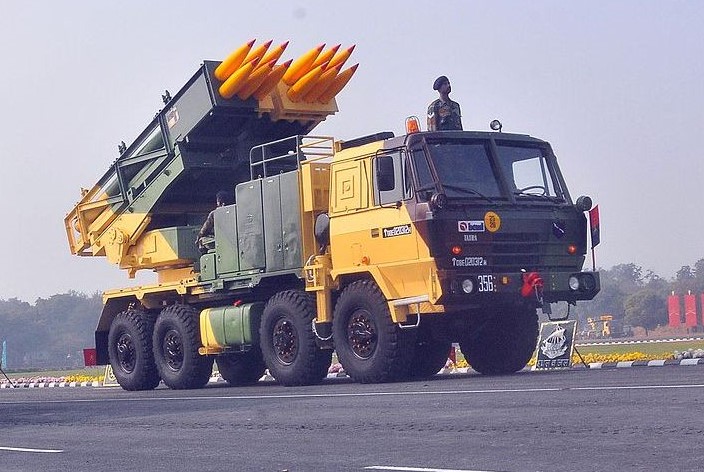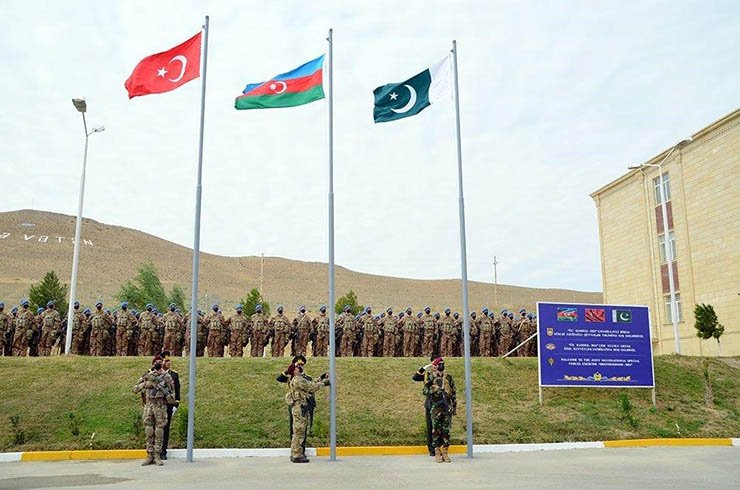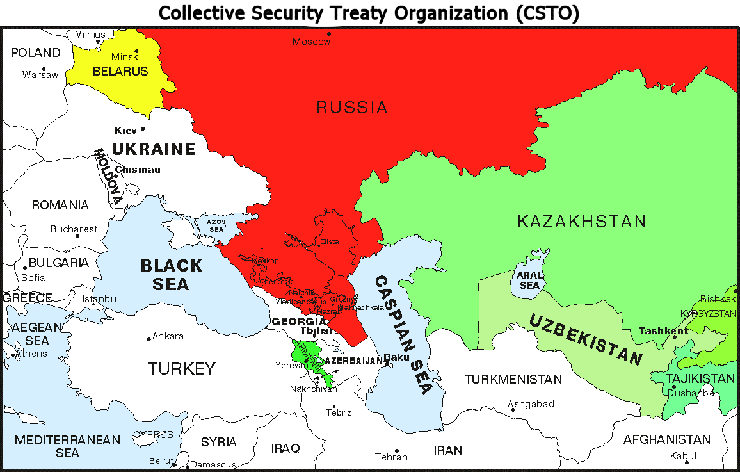
After Armenia’s bitter conflict with Azerbaijan, Yerevan is eager to increase its defence cooperation with New Delhi, as indicated by Armenia’s appointment of a defence attaché to its embassy in New Delhi. The office-bearer is tasked with scouting for new opportunities for bilateral cooperation.
India exported the Swathi weapon-locating radar system to Armenia in 2020, followed by a deal to supply Armenia with anti-tank weapons, PINAKA multi-barrel rocket launchers (MBRLs) and ammunition. Then, in November 2022, a private Indian contractor reportedly signed a $155 million contract to supply artillery guns to Armenia. Two months back, an Indian public sector enterprise had provided 50 lakh units of 7.62mm calibre bullets to Armenia, while a deal was also reported last week as part of which the same state-owned company shall provide 30mm and 40mm grenades to Armenia. This article contends that the momentum in security ties between the two countries must be boosted, and India must continue to equip Armenia’s military.
The Indian Stake
On the issue of Armenia’s ethnic exclave of Artsakh, New Delhi’s stance has been largely unflinching over the last few years, from arms sales to intercontinental rail connectivity to denouncements of Azerbaijan’s belligerence in the region. This is unsurprising given that Baku’s long-standing ties with Islamabad had turned the dispute into one of the world’s more esoteric proxy conflicts. Further, the South Caucasus region is important for India’s goal to build a logistics corridor linked to Europe through the Iranian plateau, called the International North-South Transportation Corridor (INSTC).
By capturing Armenian territory, Baku aspires for unrestricted connectivity between Turkey, Azerbaijan, and Pakistan along with the entire axis of Turkic-oriented countries, all the way to China. This route could be used for munitions and military hardware to reach the doorstep of Kashmir
In 2020, it was at Turkey’s behest that Azerbaijan attacked Artsakh as well as Armenia proper, to link Turkey with Azerbaijan via Armenia’s Syunik province, also called the Zangezur region. Turkey supplied the management, munitions, soldiers, ISIS terrorists, and other mercenaries for the assault. Ankara has been trying to leverage its alliance with Baku to strengthen its control on the region, reinstate the Ottoman Empire, and assimilate the Turkic nations of Central Asia into a seamless logistics space with common armed forces. Ankara also admonished the abrogation of Article 370 in the former Indian State of Jammu and Kashmir, while openly supporting Pakistan at various diplomatic arenas as well as at the United Nations. This is opposite to Armenia’s endorsement of India’s position on Kashmir, which views the entire territory as an inalienable part of India. Hence, continued Indian defence exports to Armenia would send a potent signal to Turkey to alter its course on India’s internal policy matters including Kashmir, given New Delhi’s new-found preparedness to choose sides rather than abiding by the non-aligned approach while pursuing its interests on the global stage.
As Azerbaijan’s ally, Pakistan has been providing trained personnel and hardware to help the former in its military campaigns. Baku has returned the favour by offering geopolitical, geoeconomic, and geostrategic benefits to its partners in Islamabad. If Baku achieves its aims in Armenia, it will significantly boost Pakistan, with dangerous consequences. By capturing Armenian territory, Baku aspires for unrestricted connectivity between Turkey, Azerbaijan, and Pakistan along with the entire axis of Turkic-oriented countries, all the way to China. Munitions and military hardware could use this route to reach the doorstep of Kashmir. To prevent this, New Delhi must leverage its military know-how and capabilities to help Armenia defend itself against Azerbaijan’s energy resources-funded superior military power.

The Russian Retreat
Distracted and exhausted by the Ukraine War, Russia is ceding its hold on nations and conflagrations across the ex-Soviet region, which Moscow considers its “near abroad”. The latest chapter in the Nagorno-Karabakh conflict, for instance, has not just concluded unfavourably for Armenia, but also for Russia. For all its pompous rhetoric and reproval of the Armenian leadership, it is obvious that the breakdown of Russia’s peacekeeping efforts has endangered its long-term influence in the South Caucasus.
The defeat of the Karabakh Armenian defence forces implemented by Azerbaijan’s armed forces in a mere day’s fighting demonstrated that the latter was more concerned about Western sanctions than Russia’s military capacity. Consequently, despite being a member of the Moscow-led Collective Security Treaty Organization (CSTO), Yerevan is henceforth unlikely to covet security guarantees from Russia.
Distracted and exhausted by the Ukraine War, Russia is ceding its hold on nations and conflagrations across the ex-Soviet region, which Moscow considers its ‘near abroad’. The latest chapter in the Nagorno-Karabakh conflict has not just concluded unfavourably for Armenia, but also for Russia
Till 2020, it was common to assume that Moscow aimed to maintain the status quo in the South Caucasus. That was why the Armenians sought Russian assistance during the Second Karabakh War, albeit to no avail. Whether Moscow could have exerted greater influence to end that conflict prior to its culmination in a devastating rout for Armenia, is still debatable. If it could have but chose not to, it has proved a strategic blunder, setting the stage for Turkey to assume greater regional salience while leaving Armenia vulnerable.
A choice available to Russia could have been to boost weapons exports to Armenia, but Moscow requires all the munitions it can muster for its military operations in Ukraine, as indicated by reported weapons buybacks from its customers across the world. Yerevan has even complained that Moscow has denied it supplies of arms it had already paid for, compelling Armenia to rely on Indian suppliers instead.

The Way Forward
New Delhi’s weapons exports to Armenia transcend a run-of-the-mill relationship. Iran’s role is critical for India to inhibit the ambitions of the Turkey-Pakistan-Azerbaijan nexus, and Yerevan’s diplomacy is trying to bridge Tehran’s and New Delhi’s interests. Though Armenia cannot buy Iranian munitions for fear of the West’s reaction, Iran continues to assume a transit role facilitating Indian weapons transfers to Armenia, as it assumed in the past for the sale of Russian munitions. During the meeting between Armenia’s Minister of Defence Suren Papikyan and his Indian counterpart on the sidelines of Defence Expo 2022, the feasibility of exporting made-in-India heavy weapons to Armenia was explored.
Iran’s role is critical for India to inhibit the ambitions of the Turkey-Pakistan-Azerbaijan nexus, and Yerevan’s diplomacy is trying to bridge Tehran’s and New Delhi’s interests. Armenia cannot buy Iranian munitions for fear of the West’s reaction but Iran continues to assume a transit role facilitating Indian weapons transfers to Armenia
New Delhi, Tehran and Yerevan must translate these political and security engagements into a solid foundation for heightened trade and economic collaboration. Whether it would be wise to rely on railway connectivity through a region that could witness a conflict between Iran and Turkey, two of the largest standing militaries in the region, is something New Delhi needs to carefully contemplate over a period of time. However, enhancing ties with Armenia along both economic and strategic lines is a must, to restore regional stability and maintain leverage over geopolitical adversaries in the region.
-The writer is serving as a Fellow at Observer Research Foundation. The views expressed are personal and do not necessarily reflect the views of Raksha Anirveda















